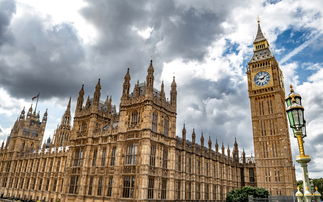The British political landscape is in desperate need of renewal, and full spectrum climate prioritisation could offer the sense of direction Westminster craves
What a truly depressing week it has been for British politics.
The Foreign Secretary's congenital inexactitude hands a PR win to the propagandists in the Kremlin. Her Majesty's Opposition finds itself publicly wrestling with 'pockets' of the most virulent anti-semitism, sparking a response that has ranged from the justifiably outraged through the dangerously conspiracy-minded to the hypocritically opportunistic. Political leaders decide the best way to respond to an outbreak of murderous gang violence on the streets of the capital is with partisan point-scoring.
Meanwhile, the Brexit process rumbles on, with observers seemingly now so jaded that the revelation a senior civil servant regards the UK's trade strategy as "basically tweeting out flag emojis" raises quizzical eyebrows rather than alarm bells.
Against this backdrop some political commentators have indulged in one of their periodic bouts of speculation about the prospects of a centrist revival. Tony Blair has granted interviews; David Miliband, for reasons unclear, has spent a day trending on Twitter; the Lib Dems have watched on and quietly despaired.
Hopes that a centrist champion might emerge has in turn prompted a critique of why talk of a new party or wider centrist revival appears doomed to failure. As the Guardian's John Harris observed: "The problem of the political 'centre' is not the whereabouts of D.Miliband. It's that it has almost no ideas - or even instincts - relevant to a world transformed by the crash of 2008, something proved by a residual tendency to imagine a revival authored by one individual." Labour peer Stewart Wood offered a similar assessment. "If we are honest, politics in Britain is in desperate need of philosophical renewal," he tweeted. "Sad to see some self-proclaimed 'centrists' instead reaching for the conspiracy theories so beloved of populists, or hoping for new Messiahs instead of developing new ideas."
If we are honest, politics in Britain is in desperate need of philosophical renewal. Sad to see some self-proclaimed "centrists" instead reaching for the conspiracy theories so beloved of populists, or hoping for new Messiahs instead of developing new ideas.
— Stewart Wood (@StewartWood) April 4, 2018
The most frustrating aspect of this diagnosis is not just its accuracy, but the fact big new political ideas are readily available if only politicians would choose to search for them. Indeed, such ideas are scattered across the green economy like shiny, precious emeralds just waiting for mainstream political leaders to recognise their appeal and pick them up.
Climate action; the development of a net zero emission economy; liveable, breathable clean communities; a war on plastic and waste; outdoor education. These inter-locking themes and many others offer an obvious opportunity to revive our politics from the centre and inject a sense of mission, pride, and shared endeavour into public life. And yet for all the welcome progress made by the cross-party consensus in support of climate action, a strange reluctance to fully and vocally embrace this agenda persists.
The cynical response to such ideas would be to simply note that a) all parties are already nominally committed to delivering them, and b) the Lib Dems and Green Party have been pushing the vision of a low carbon revolution for years, all to little electoral avail.
But the combination of escalating climate risks, growing clean tech momentum, and the environmental awareness of younger voters, means it is hard to envisage how a new centrist political force - or an election-winning tack to the centre from one of the two main parties - could be engineered without placing full spectrum climate action at its core. Anyone doubting this reality need only look across The Channel at the poster boy for global centrism, Emmanuel Macron, and his rapid emergence as the world's most visible eco-warrior.
How then could Wood's philosophical renewal of British politics be delivered along green lines?
First up, our putative centrist hero (regardless of whether or not their surname is Miliband) would need to establish the narrative; to explicitly spell out how climate action and the development of a greener, healthier economy would be the animating purpose of their government.
This question of political narrative is too easily overlooked. What is the current defining narrative of the government? Seriously, it's a genuine question, because I haven't a clue. 'Brexit means Brexit' is meaningless tautology. May had some interesting things to say about 'tackling burning injustice' and aiding those who were 'just about managing'. But not a single policy idea to back up her supposed priorities has emerged beyond opening more grammar schools, which she hasn't actually done and which all the evidence suggests wouldn't work anyway. Instead her government seems defined by nothing beyond Brexit, an undersold and under-funded industrial strategy, a welcome but inadequate plan to tackle plastic waste, and a hostility towards 'citizens of nowhere' which may have been intended as an attack on multinational tax evaders, but was so tin-eared as to easily be interpreted as bristling contempt for anyone who voted remain.
Across the aisle, 'for the many, not the few' may have the clarity of unalloyed socialist intent, but in Jeremy Corbyn's hands it is hard to see how a narrative that is easily hijacked by the hard left can breach the crucial 40 per cent vote share. A thought experiment: can you think of a single move from the Labour leadership since the election that would make a non-Labour voter think 'ah, I was wrong to doubt him, next time I'm voting for Corbyn'?
The thing is, all successful governments have a narrative and a form of words that defines them, that secures their place in the history books.
We still talk of Wilson's "white heat of technology" and the sense of swinging Sixties optimism it engendered. Thatcher's "there is no alternative" and "no such thing as society" helped imbue the most controversial of reforms with a sense of missionary zeal and innate inevitability. Blair's "education, education, education" and cultivated Cool Britannia image helped create a sense of turn of the century revival and made the case for a generously funded restoration of the public realm. Cameron and Osborne's 'long term economic plan' - and less successful 'big society' and 'global race' - were critical to justifying an unprecedented shrinking of the state, neutralising all opposition even as the public endured one of the longest periods of wage stagnation in history.
More recently anyone still doubting the importance of getting the narrative and the soundbite right needs to consider just three words: take back control.
Get the narrative right and it opens up a lot of space to actually do things. The problem is that since the 2008 crash the dominant narratives, for all the Brexiteers' talk of sunlit uplands, have been populist, divisive, and unconvincing. The desire amongst a large chunk of the voting public for a more positive, compelling, and future-oriented vision has been palpable. That should create an opportunity for those who want to revive the centre and give the UK a post-Brexit sense of direction. Tackling the greatest long term challenge of the 21st century seems the most obvious of starting points.
How do you condense the climate action narrative to a telling political soundbite? That is a question for expensive political consultants to consider - be in no doubt our hypothetical Thames Valley Macron could afford the very best political consultants. But the promise of a green revival, of the UK leading the next global industrial revolution, of enhancing communities across the country and creating good jobs in pursuit of a shared endeavour has the potential to resonate. You might even say there is no alternative to harnessing the green heat of technology in pursuit of a sustainable long term economic plan. Decarbonisation, decarbonisation, decarbonisation.
I've cited this quote from the centrist political columnist Matthew D'Ancona in the past, but it bears repeating. Responding to the floods that ravaged parts of the UK in 2014 he observed: "if the PM truly believes that anthropogenic global warming is responsible for potentially catastrophic changes in the weather - then it ought, logically, to be his priority, more important even than economic recovery. One cannot be 'pragmatic' or 'in favour of sensible compromise' about a threat to the survival of the human race."
A government that explicitly made climate action its over-riding priority could suddenly do a lot of things the current administration is already working on, but deliver its welcome environmental reforms and programmes at the requisite, epoch-shaping scale.
You could face down opponents and start building low cost wind and solar farms again. You could enact an infrastructure-funded national building upgrade programme. You could introduce real zero carbon home standards. You could fund CCS demonstrations. You could bring forward the phase out dates for the internal combustion engine and avoidable plastic. You could drastically boost funding for zero emission buses, cycling infrastructure, and green spaces. You could launch a series of properly funded R&D programmes to tackle hard to reach emissions from aviation, shipping, and industry. You could fast-track green farming subsidy reforms. You could build on the decision to block the Druridge Bay coal mine and block other new carbon intensive infrastructure. You could properly develop and fund transition plans for carbon intensive regions. And you could introduce a Net Zero Emission Act.
But you could also do a lot more beyond the obvious green policy wish list, pursuing policies specifically designed to link the UK's new national project to people's everyday lives. You could turbo-charge the woodland nursery, outdoor education movement. If universal basic income is still too out-there, you could award green bonds or ISAs to every child. You could embark on a serious public health campaign that seeks to ease pressure on the NHS through everything from clean air zones to community gardens. You could harness the plummeting cost of renewables to transform our public buildings and transport networks. You could try to make Meat Free Monday an actual thing at all public institutions and large businesses. You could dish out stamp duty rebates for green homes bought with green mortgages.
The vast majority of these reforms would be highly popular with the public (if not with the press), especially if you threw in the green retail policies governments and environmental groups have failed to embrace.
The challenge would, as ever, be funding. The deficit hawks - many of whom remain intensely relaxed at the economic risks associated with Brexit - would be up in arms at this climate spending largesse. But there are ways to address their concerns. Firstly, if climate action is the genuine priority then a lot of funding can be reassigned from programmes that are suddenly of a lower order of importance. In many cases, the requirement would be as simple as properly tweaking government procurement rules and project specifications to ensure the environment is properly accounted for. It is also worth remembering that in many cases green reforms do not require significant levels of funding and would deliver long term financial savings.
Secondly, climate prioritisation is essentially a stimulus package, it is an investment, it has a multiplier effect. As many of the world's leading businesses have found, as clean tech costs continue to fall decarbonisation can become the economically rational path.
Third, prioritising climate action opens up space for fiscal reform. A government that regarded climate change as its top priority could take the plunge and cut income taxes while cranking up pollution taxes. Taking a leaf from Vote Leave's playbook, imagine a hypothecated tax on sources of air pollution to fund NHS spending.
Finally, climate prioritisation provides the perfect antidote to the austerity narrative. The most compelling argument in favour of austerity has always been that it is wrong to make future generations pick up the bill for our excessive expenditure. It is a narrative that continues to resonate a decade on from the financial crash that unleashed the current rolling wave of interlocking crises faced by many industrialised economies.
But what if a government made climate action its priority and explained that investments were being made in the interest of future generations. Is it then so unreasonable to ask them to pick up a share of the bill attached to infrastructure from which they benefit? The UK's last WWII debt repayment was made in 2006. I don't recall anyone of my generation attacking our grandparents for burdening us with debts, in fact we lauded them for their bravery in defeating fascism and re-building one of the world's leading economies.
The more mundane and effective riposte to calls for political climate prioritisation is that it simply would not cut through with the public. Just as the BBC continues to resist the urgent need for a landmark series on climate change on the spurious assumption people aren't interested, many politicians believe environmental issues remain a niche concern.
But this scepticism feels outdated on two fronts. Firstly plenty of polling shows environmental issues and clean technologies are in fact wildly popular and of growing importance, especially to younger voters. The Conservative's welcome recent focus on tackling plastic waste was triggered by polling from the Bright Blue think tank showing voters under 40 regard action on the environment in general and climate change in particular as a top priority.
Secondly, the past few years have demonstrated once again how political campaigns can shift public opinion. For decades the EU was regarded as being of interest only to right wing political obsessives. One savvy campaign and some cynical eliding of EU and NHS funding later and it is the dominant issue in British politics.
Could it work, then? Could a programme of full spectrum climate action lead a philosophical revival of British politics that either shifted and emboldened the centre or allowed one of the main parties to decisively break the current deadlock? To be honest it still feels unlikely. There are politicians in all parties who want to pursue such an agenda, and in fairness both the government and opposition have quietly embraced steadily more ambitious climate policies that have established the UK as a green economic leader. But this handful of political trailblazers remain hampered by vested interests, media indifference, and their leaders' fixation on Brexit. Even where strong new green measures are adopted there is a reluctance in both Number 10 and the Labour Leader's office to make them central to their party's core narrative.
And yet, as anyone who cares about politics and the post-Brexit direction of the UK, not to mention the future of the planet, must now realise new ideas are desperately needed. Delivering a green revival would be supremely challenging, extremely high risk, and not without its influential detractors. But there is one thing it wouldn't be. It wouldn't be depressing.









